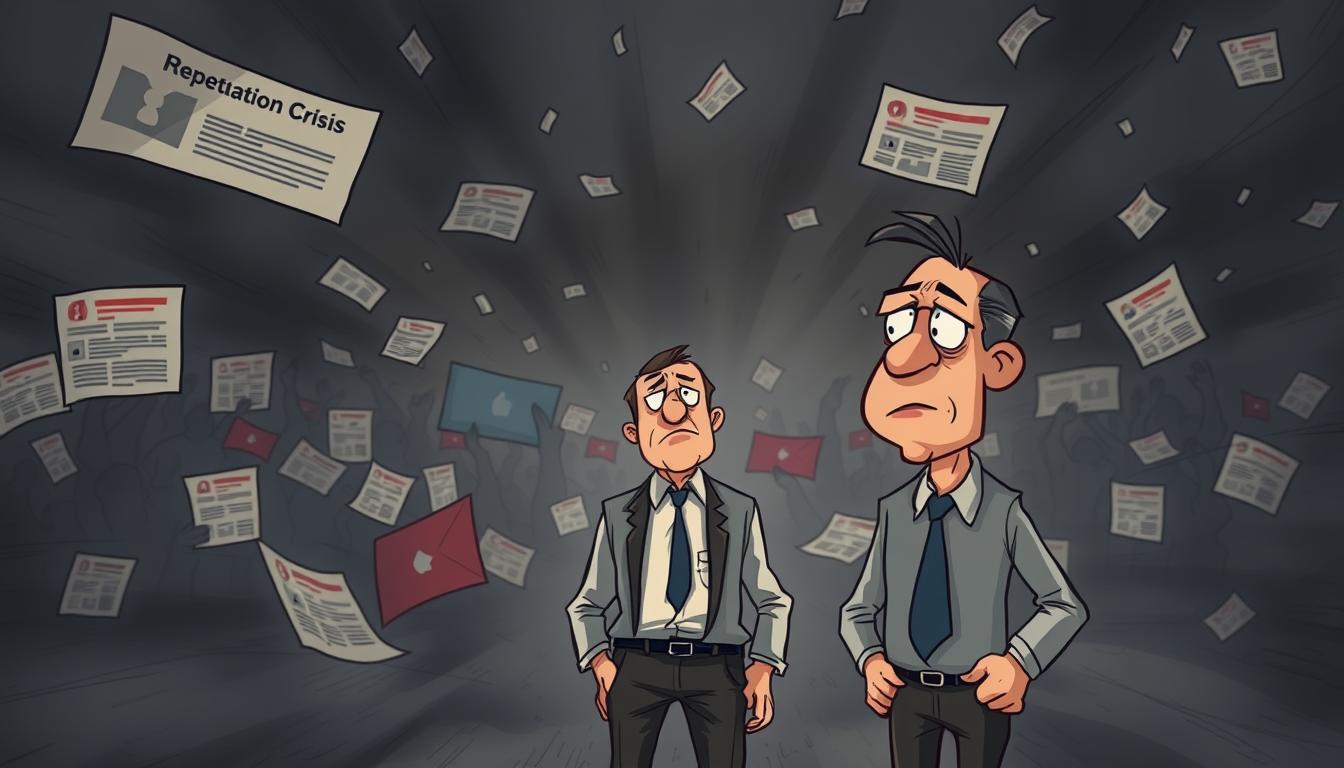In today’s interconnected digital world, mastering reputation crisis management is crucial for every business. Even the most successful companies can face unexpected challenges, and having a robust management plan is essential to recover swiftly and maintain trust.
A crisis can emerge suddenly, whether through social media or unforeseen events. This makes proactive preparation vital. Our guide provides 10 actionable steps, drawing on proven strategies from leading brands to help you navigate such situations effectively.
At ReputationReturn.com, we offer free, confidential consultations to address your specific concerns immediately. Our expertise combines technical knowledge with accessible advice, ensuring both business owners and professionals find practical solutions.
We are committed to transparency and trust, providing a comprehensive review of crisis management fundamentals. Let us guide you through the process with empathy and expertise.
Key Takeaways
- A well-thought-out crisis management plan is vital for recovery.
- Proactive preparation is key to handling sudden crises on social media.
- Our guide offers 10 actionable steps based on proven strategies.
- Contact ReputationReturn.com for a free, private consultation.
- Transparency and trust are cornerstone of effective crisis management.
Understanding the Nature of a Reputation Crisis
In the fast-paced digital landscape, a reputation crisis can unfold in the blink of an eye, catching even the most prepared businesses off guard. It’s crucial to grasp what defines such a crisis and how to identify its early signs to mitigate potential damage.
What Constitutes a Crisis?
A reputation crisis isn’t just a minor hiccup; it’s an event that disrupts normal operations and threatens a company’s standing. This can range from a small public outcry to a full-blown scandal. For instance, a single negative comment can spiral out of control without a proactive management plan in place, escalating into a major issue that affects customer trust and brand perception.
Recognizing Early Warning Signs
Being proactive is key. Early signs might include sudden spikes in negative social media trends or an unusual increase in customer complaints. These indicators signal that a larger problem may be looming. By monitoring these signals through social listening tools, companies can respond swiftly, preventing minor issues from escalating into full-blown crises.
Understanding these signs allows businesses to mobilize the right strategies and establish a clear management plan. Acting early can significantly reduce the impact on brand perception and customer trust. At ReputationReturn.com, we specialize in helping businesses navigate these challenges with expertise and care.
Developing a Proactive Crisis Management Plan
In today’s fast-paced digital world, a well-structured crisis management plan is essential for any business aiming to protect its brand and maintain customer trust. At ReputationReturn.com, we specialize in helping businesses craft detailed strategies to navigate challenges effectively.
Establishing a Crisis Management Team
A successful plan begins with a dedicated team. This team should include roles like executive leadership, PR, legal, and HR to ensure a coordinated response. Each member plays a vital role in addressing different aspects of the issue, from communication to legal implications.
Mapping Out the Response Process
Creating a clear response process is crucial. This involves defining escalation paths and communication channels to ensure timely and effective action. For instance, major brands have shown that a detailed strategy not only controls damage but also helps rebuild trust post-crisis.
| Component | Description | Importance |
|---|---|---|
| Team Roles | Defined roles for leadership, PR, legal, and HR. | Ensures coordinated and effective response. |
| Tools | Utilizes sentiment analysis and real-time monitoring tools. | Guides informed decision-making and timely interventions. |
| Strategy | A detailed plan with escalation paths and communication channels. | Acts as both a shield and blueprint for recovery, fostering trust and confidence. |

A well-developed plan acts as both a shield and a blueprint for recovery, fostering internal trust and customer confidence. At ReputationReturn.com, we offer free consultations to help you craft the best strategy for your needs.
Implementing Effective Reputation Crisis Management
When a situation arises, swift action is crucial. Companies must leverage social media channels to communicate clearly and consistently. This approach helps control the narrative and mitigate further damage.
Leveraging Social Media Channels
High-engagement platforms like Twitter and Instagram allow for real-time updates. Being transparent during evolving issues fosters trust. For instance, addressing concerns promptly on these channels can demonstrate accountability and responsibility.
Coordinated Communication Strategies
A well-coordinated strategy ensures all messaging aligns. Assigning clear roles to employees and communications teams is essential. This structured process ensures every step is executed meticulously, protecting the brand and restoring trust.
For example, companies that align internal and public communications effectively can turn potentially damaging issues into opportunities. This proactive process not only resolves the situation but also enhances long-term trust.
If your business is facing a challenging issue, consider reaching out to experts. Visit this resource for guidance on navigating such situations effectively.
Leveraging Digital Tools and Social Listening
In today’s digital age, employing advanced tools and social listening platforms is essential for tracking customer sentiment and addressing concerns promptly. These tools empower businesses to monitor online conversations, identify early warning signs of potential issues, and respond effectively before they escalate.
Tracking Online Conversations
Digital tools like social media monitoring platforms and sentiment analysis software enable businesses to track mentions of key topics across various channels. These platforms help pinpoint potential crises by detecting changes in tone, sentiment, and mention frequency, allowing for timely interventions.
By leveraging real-time data, the crisis management team can craft rapid, informed communication responses. Integrating these tools into existing management plans ensures seamless information flow across the organization, enhancing overall efficiency and effectiveness.
Monitoring customer feedback and online sentiment allows companies to adjust their strategies, better managing public perception and fostering trust. Tools like Sprinklr aggregate data from multiple sources, providing comprehensive insights for consistent brand reputation monitoring.
At ReputationReturn.com, we emphasize the importance of real-time monitoring and prompt communication. Our expertise helps businesses align their teams and systems for effective crisis management, ensuring trust and brand safety. Contact us for a free consultation to integrate these tools into your strategy and enhance your service delivery.

Real-World Examples and Lessons Learned
Understanding how leading brands have navigated challenging situations provides valuable insights into effective strategies. These examples highlight the importance of swift action and clear communication.
Case Studies from Leading Brands
Southwest Airlines demonstrated resilience during an in-flight crisis by prioritizing passenger safety and maintaining transparent communication. Their approach emphasized empathy and accountability, which helped mitigate public concern.
Samsung’s response to the Galaxy Note 7 issue offers another valuable lesson. By swiftly recalling the devices and establishing a battery advisory group, Samsung addressed customer concerns effectively, minimizing long-term damage to their brand.
KFC’s handling of a transportation crisis is a prime example of quick communication. By addressing the issue head-on through social media, KFC turned a potential disaster into a manageable event, showcasing the power of proactive strategies.
| Brand | Strategy | Outcome |
|---|---|---|
| Southwest Airlines | Transparent communication and passenger safety focus | Mitigated public concern |
| Samsung | Swift recall and battery advisory group | Minimized brand damage |
| KFC | Quick communication via social media | Turned potential disaster into a manageable event |
These examples underscore the importance of a unified organizational approach in mitigating damage and restoring trust. For more guidance on navigating such situations, visit this resource or explore these key questions to ask a reputation management company.
Get Free, Private Consultation with ReputationReturn.com
When facing a situation that could potentially damage your brand, immediate support is crucial. At ReputationReturn.com, we offer free, private consultations to help you address concerns swiftly and effectively. Our expertise is designed to provide you with the tools and strategies needed to navigate challenging situations with confidence.
Why Immediate Support is Key
- Our consultation service provides personalized crisis diagnosis and tailored response plans to address your specific needs.
- By addressing issues early, we help prevent further damage and protect your brand from negative publicity.
- Early intervention can mitigate consumer backlash and preserve positive reviews and messages in the public domain.
At ReputationReturn.com, we are committed to guiding your crisis management team with expertise and care. Learn more about how we can help you recover from even the most damaging incidents.
Conclusion
In today’s fast-paced digital world, navigating the complexities of modern business demands a proactive approach to safeguarding your brand. Our 10-step guide has outlined essential strategies to address challenges effectively, from early warning signs to coordinated communication.
A well-structured plan is vital, ensuring swift responses and aligned messaging. Real-world examples from leading brands like Southwest Airlines and Samsung highlight the importance of empathy and transparency in maintaining trust during difficult times.
Every organization must be prepared for the unexpected. By reflecting on these lessons and implementing best practices, businesses can turn potential setbacks into opportunities for growth. Remember, a clear strategy and prompt action are key to protecting your brand and fostering long-term trust.
At ReputationReturn.com, we offer free, confidential consultations to help tailor these strategies to your needs. Don’t wait—take immediate steps today to ensure your brand’s safety and maintain a positive public image. Learn more about how we can guide you through challenging situations with expertise and care.
FAQ
What are the first steps to handle a reputation crisis?
The first steps involve assessing the situation, assembling your crisis management team, and establishing clear communication channels to ensure a coordinated response.
How can social media be leveraged during a crisis?
Social media can be used to monitor public sentiment, address concerns promptly, and share official statements to maintain transparency and trust.
What tools are essential for tracking online conversations?
Utilize social listening tools and analytics software to monitor mentions, sentiment, and trends, enabling a proactive approach to crisis communication.
How can a company rebuild trust after a crisis?
Transparency, consistent communication, and demonstrating actionable steps to prevent future issues are key to restoring trust and safeguarding your brand.
What role do employees play in crisis management?
Employees are crucial as they can serve as brand ambassadors, providing internal support and helping to communicate consistent messaging to the public.
How can a crisis management plan be effectively implemented?
Develop a structured plan with defined roles, communication strategies, and response protocols to ensure a swift and effective reaction to any crisis situation.
Why is immediate action important during a reputation crisis?
Prompt action helps mitigate damage, demonstrates responsibility, and can prevent the escalation of the issue, protecting your brand’s integrity.
What are the benefits of a free consultation with ReputationReturn.com?
A free consultation offers tailored advice and strategies to address your specific needs, ensuring you receive expert guidance to navigate any reputation challenges effectively.















